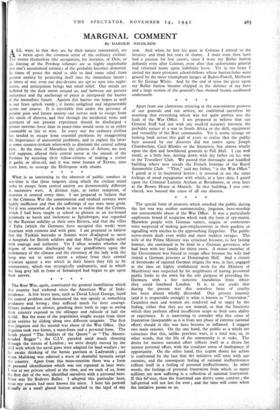The special form of neurosis which attacked the public during
the last war was neither sentimentality, jingoism, hero-worship nor unreasonable abuse of the War Office. It was a particularly unpleasant brand of suspicion which took the form of spy-mania. Harmless people with German names, origins or connexions were suspected of making gun-emplacements in their gardens or signalling with torches to the approaching Zeppelins. The public nerve-storm dealt even wider and more reckless ravages. The wife of the Prime- Minister was criticised because, to her lasting honour, she continued to be kind to a German governess who had been with her family for thirty years. A minor member of the Government was forced to resign office because his wife had visited a German prisoner at Donnington Hall. And a citizen of Sevenoaks of reputed German origins (he was, in fact, engaged at the time on highly confidential work for the Ministry of Munitions) was suspected by his neighbours of having presented public baths to the town for the sole purpose of providing the Germans with a fine concrete foundation from which they could bombard London. It is to our credit that during the present war this senseless form of cruelty has been almost wholly discarded. Our present neurosis (and it is respectable enough) is what is known as " frustration." Countless men and women are rendered sad or angry by the feeling, either that they are not wanted, or that the functions which they perform afford insufficient scope to their own ability or experience. It is interesting to consider why this sense of frustration (inseparable as it is from any phase of extreme national effort) should in this war have become so inflamed. I suggest two main reasons. On the one hand, the public as a whole are conscious that this, unlike previous wars, is a total war, or, in other words, that the life of the community is at stake. The desire for intense national effort reflects itself in a desire for intense personal effort, with the resultant sense of inadequacy of opportunity. On the other hand, this urgent desire for action is confronted by the fact that the initiative still rests with our enemies, and the consequent feeling of national ineffectiveness reflects itself in a feeling of personal ineffectiveness. In other words, the feelings of personal frustration from which so many millions are now suffering is a reflection of national frustration. If this be true, then the frustrated can derive some comfort ; the lull-period will not last for ever ; and the time will come when the initiative passes to us.






















 Previous page
Previous page